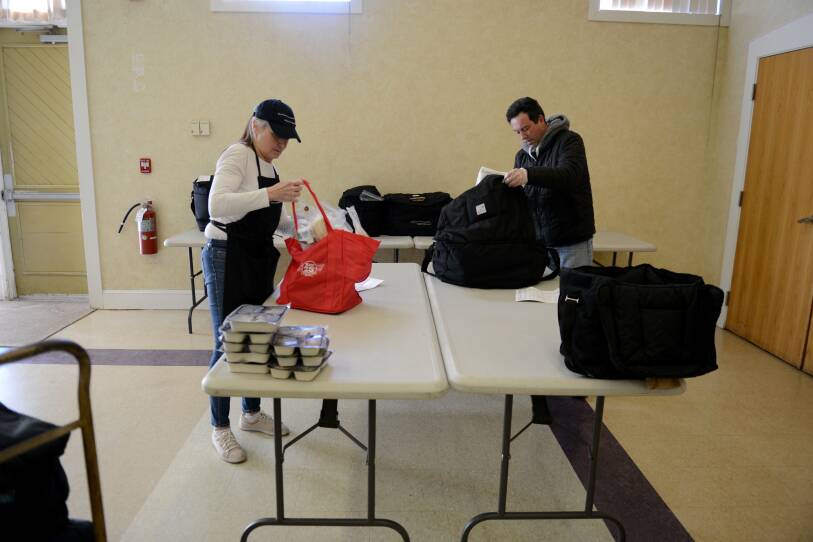For Meals on Wheels providers in Massachusetts, the coronavirus outbreak is creating both unprecedented demand for their services and unique challenges for their operations.
Elder service agencies that operate Meals on Wheels programs say there’s been a surge in demand from senior citizens in the wake of Gov. Charlie Baker's public health advisory urging Massachusetts residents to stay home.
Older people are increasingly fearful of venturing outside to shop for groceries as the number of coronavirus cases grow daily, social service agencies said.
“We're receiving about 50 new referrals for home-delivered meals every day,” said Valerie Frias, the head of Ethos, an elder services agency in Boston and the state’s biggest provider of Meals on Wheels. Their meal deliveries have gone from 8,000 meals a day to 10,000, delivered all over Boston by about 40 paid drivers.
That means a scramble to hire more drivers and line up new caterers to prepare meals if the requests keep rising.
But the virus has also created a raft of new safety protocols that are complicating the process of delivering a meal.
“Gloves are new as of a couple of weeks ago, and the masks are new really as of [last week],” said Frias. “We actually have a sewing project going on and are sewing our own [masks] in-house with some volunteers.”
Frias said there is a new emphasis on sick leave rules that prevent drivers from working if they or anyone in their household have any symptoms of cold or flu.
Instead of bringing the meals into an elder’s home, they are now left at the door, she said.
“We’re having the driver step back, wait for some verbal confirmation that the person is there, because part of our model is that it's also a well check on the elders,” said Frias.
This new form of social distancing is the hard part for Robert Thomas, a volunteer driver who’s delivered meals in Methuen for the last four years. Gone is the time for him when he could stop and socialize with some of the 15 people on his route.
“It's hard for me not to spend the time with them because [for] a lot of these people, the only person they see is me. And I like to create a situation that [they] can count on me,” said Thomas. “But it's pulling back a little bit.”
Thomas is one of about 130 drivers for Elder Services of Merrimack Valley and the North Shore. Unlike Ethos in Boston that pays its drivers, the Merrimack Valley agency relies mostly on volunteers.
Many of them are over 60 years old themselves, like Thomas, who’s 66. He said he’s not too worried about getting COVID-19 while doing this work, but some other volunteers have gotten concerned and decided to stop.
“This has been a bit of a double whammy for us,” said Jennifer Raymond, who heads up strategy for the Merrimack Valley elder agency. “The dramatic increase in meals mean we need more volunteers and are adding routes. At the same time, many of our drivers are vulnerable themselves so we are losing a few drivers as a result.”

Raymond said they are now trying to recruit local teachers to volunteer for deliveries since schools are closed down. Demand for meals at Raymond’s agency is also up more than 20 percent, and their drivers are now delivering more than 2,400 meals a day across two dozen cities and towns north of Boston.
Linda Vieira, a site manager for the elder services agency, oversees 15 drivers and makes 60 deliveries a day to apartments in Lowell.
She’s also 70 years old, and despite her age, she said she’s not worried about getting infected with the coronavirus.
“I feel that I'm all OK as long as I protect myself — stay my distance, wash my hands and use a lot of disinfectant wipes,” she said.
Vieira wants to keep pitching in because she knows how much these elders depend on this food.
“They tell you that, ‘I don't have any food. This is the only hot meal I have every day,’” Vieira said. “Sometimes when our schedule gets a little off kilter, people go, ‘Oh, I've been waiting for my lunch.’ Their fork and their knives (are) on the table, waiting for that meal to come.”
As the pandemic leaves seniors with no place to go, agencies said increasing numbers of elders are now requesting a second meal — frozen or shelf-stable — to get them through the rest of the day and help them to stay put at home.
To qualify for Meals on Wheels, people must be at least 60 years old and homebound, meaning they have trouble leaving their home without assistance. The intake number for meals program in Massachusetts is 800-892-0890, Monday through Friday from 8 a.m. to 5 p.m.





